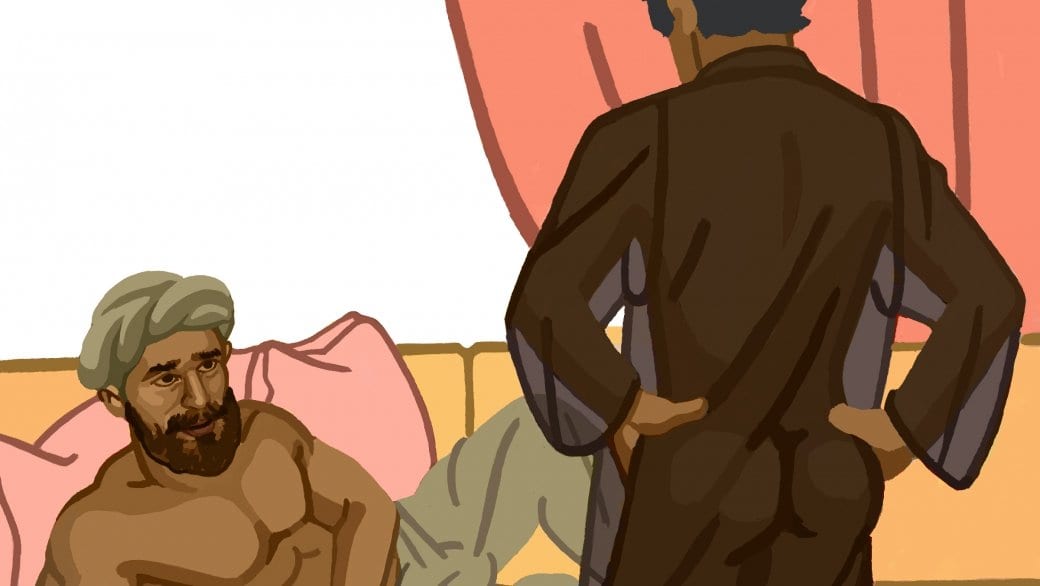In heaven, there are gardens full of fruit to eat while you recline in silk clothes, and “youths of perpetual freshness” circulate around. “If thou seest [the youths], thou wouldst think them scattered Pearls,” says the Quran (Sura LXXVI). As the holy text at the centre of Islam, the Quran was said to be revealed to the Prophet Mohammed by God via an angel. Alongside bashful virgins on couches, the oral teachings of Al Hadis, work attributed to the Prophet, say that Paradise also has “a market wherein there will be no buying or selling, but will consist of men and women. When a man desires a beauty, he will have intercourse with them.” Basically, there’s plenty of boyfucking to go around in the afterlife.
Islam got its start in the seventh century when Mohammed, a man from Mecca, united the tribes of the Arabian Peninsula under this new faith. Within a century, Islam spread from the Strait of Gibraltar through the Mediterranean and into parts of Southeast Asia. Modern perception sees Islam as the antithesis of gay life when, historically, it created the perfect storm for tons of same-sex action.
Men were allowed multiple wives or concubines, when affordable, whereas women’s sexuality and autonomy were tightly restricted in a system of property. A deep segregation of the sexes made homosexual sex one of the few sexual outlets for people. Much like the rest of the Ancient world, classic Islamic society was rife with elder-student relationships, pederasty, unapologetically degenerate artist/intellects and secret lesbian liaisons. Depending on the rulers at the time, homosexuality in the Islamic world ranged from necessitating constant discretion, to being tolerated or outright celebrated. There was an extraordinary amount of interplay between homosexuality and Islamic society.

All of these things are demonstrated in a single piece of Arabic literature, second only to the Quran in fame and influence: One Thousand and One Nights. In this collection of stories within a story, Shahryar, a fictional Persian king, hates women. He had his wife killed for suspected infidelity, and then made a habit of marrying virgins before killing each of them after their wedding night. Scheherazade, the scholarly virgin daughter of Shahryar’s vizier, offered herself up to the gynocidal ruler, but with a plan. She would tell a story to the king each night but leave off the ending, so he’d have to come back to her the next evening. A few of Scheherazade’s stories touch on the life of a very real and flamboyant hedonistic poet, Ab Nuws.
Nuws was born in 756 in the town of Basra, in what’s now Iraq. After being sold to a shopkeeper in Basra, Nuws’ good looks and intelligence caught the attention of his cousin, a poet. The cousin purchased the adolescent, gave him an education, and they became lovers. They moved together to Baghdad where Nuws developed a reputation for his quick wit and dirty poetry, demonstrable within “In the Bath-House:”
In the bath-house, the mysteries hidden by trousers
Are revealed to you.
All becomes radiantly manifest.
Feast your eyes without restraint!
You see handsome buttocks, shapely trim torsos,
You hear the guys whispering pious formulas
to one another
(‘God is Great!’ ‘Praise be to God!’)
Ah, what a palace of pleasure is the bath-house!
Even when the towel-bearers come in
And spoil the fun a bit.
Sentiments any queer guy who’s ever been in a locker room can relate to.
In one of Scheherazade’s adventures of the hedonistic poet, he reads as decidedly pansexual — he’d probably fuck anything with a pulse. A eunuch is sent to find Nuws for a despondent Caliph — the leader of the Islamic government. The eunuch, of course, finds Nuws in a “disreputable tavern” where he’s “in pawn for a young boy” to whom he promised a sum of money. The youth appears in three layers of tunics, white, red and black, and Nuws exchanges a colour-themed poem for each layer of clothing. The eunuch returns to the Caliph with news of Nuws debt. The Caliph is both amused and annoyed, and pays the sum of money for a drunken and lustful Nuws to return. Later in the same story Nuws waxes lyrical about cups and lips to a beautiful slave girl the Caliph has promised a palace to.
The real Nuws was fortunate to live during the reign of the liberal Abassid dynasty, which ruled from 750-1258 CE . . . but this doesn’t even begin to scratch the depths to which homosexuality ruled over Islamic culture, so perhaps we’ll come back to further stories of our hedonistic poet and how he squared his life with Allah some other evening.
(History Boys appears on Daily Xtra on the first and third Tuesday of every month. You can also follow them on Facebook.)
(Original illustration by Yigi Chang.)


 Why you can trust Xtra
Why you can trust Xtra


